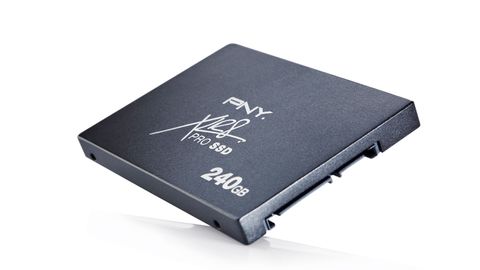TechRadar Verdict
Pros
- +
Good performance
- +
3 year warranty
- +
Good price
Cons
- -
Not the fastest drive around
Why you can trust TechRadar
PNY is a name normally associated with Nvidia-based consumer graphics cards, and maybe the odd memory modules. In fact it makes a whole range of memory-based hardware too. It's therefore no surprise to see a range of SSDs in its lineup, from desktop models to enterprise level drives.
The XLR8 branding is used on high performance parts, so it's appropriate that the LSI SandForce SF-2281 equipped XLR8 Pro 240GB carries the same tag.
Three drives make up the range: 120GB, 240GB and the flagship 480GB. A combination of the SF-2281 controller and synchronous NAND is usually a recipe that makes for a really quick drive, and the XLR8 Pro holds up that tradition.
PNY's quoted maximum read/write performance figures for the drive are up to 550MB/s for reads and up 520MB/s for writes. Both figures appear to be bang on the money, as when the drive was tested with the ATTO benchmark it produced figures of 556MB/s and 530MB/s for the reads and writes respectively, making it one of the fastest SandForce drives available.
Even in the more demanding AS SSD benchmark it holds up well, producing scores of 509MB/s and 307MB/s respectively for read/writes in the benchmark's sequential test.
So the headline performance is stunningly quick, but what about getting into the nitty gritty of how the drive handles the everyday task of reading and writing small random files?
Well a quick glance at the AS SSD 4K test results shows the drive copes extremely well, 20MB/s for random reads and 62MB/s for random writes puts it well within the top ten fastest SSDs currently available.
When it comes to real life performance the XLR8 Pro 240GB doesn't hang about either; a 4GB photo took a mere 51 seconds to copy from one folder to another, and it took just five minutes 53 second to copy a 50GB folder of mixed file sizes and types.
Benchmarks
Sequential read performance
AS SSD: Megabytes per second: Bigger is better
PNY XLR8 PRO 240GB: 509
INTEL SSD 335 240GB: 484
OCZ VERTEX 4 256GB (V1.5FW): 435
Sequential write performance
AS SSD: Megabytes per second: Bigger is better
PNY XLR8 PRO 240GB: 307
INTEL SSD 335 240GB: 313
OCZ VERTEX 4 256GB (V1.5FW): 477
4K random write performance
AS SSD: Megabytes per second: Bigger is better
PNY XLR8 PRO 240GB: 62
INTEL SSD 335 240GB: 56
OCZ VERTEX 4 256GB (V1.5FW): 57
King size
The drive's capacity is made up of 16 16GB 25nm synchronous Intel NAND modules, of the 3K P/E flavour. These modules are split eight per side of the PCB, with the controller joining them on one side of the board.
Thinking about sticking this in a slimline notebook? Well, you're out of luck. The drive is built on the standard 9mm format so it's just too chunky to fit in a slender chassis.
The drive reviewed was bare - well, it comes with a SATA data cable - the Pro range is available in an installation kit that includes a mounting rack and Acronis True Image HD data migration software.
As you might expect for a drive using 3K P/E NAND, it comes with a three-year warranty. PNY has entered the vicious bear pit that is the SSD market with some pretty aggressive pricing for the Pro range: £90 for the 120GB model, £152 for the 240GB, and £301 for the 480GB drive. That price for the 480GB model shows just how competitive the SSD market has become in the last twelve months.
If you cast your mind back to this time last year, that was the asking price of most of the 240/256GB SSDs available.

